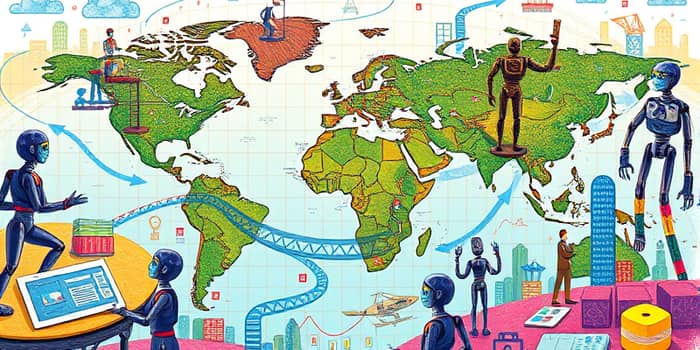In a world undergoing seismic shifts, technology stands at the epicenter of transformation. From the smallest start‐ups to multinational corporations, organizations harness digital tools to innovate, compete, and grow. Yet alongside these opportunities lie complex challenges—from job displacement to widening inequality—that demand our collective attention and action.
By charting the interplay between innovation, markets, and societies, we can navigate this epoch of progress with foresight and empathy. This article examines the most critical trends and offers practical insights to foster inclusive and sustainable growth.
Transformation by the Digital Economy
The rise of the digital economy has been nothing short of revolutionary. Businesses no longer rely solely on brick-and-mortar operations; instead, they leverage online platforms to reach customers across continents in milliseconds. The COVID-19 pandemic accelerated this shift, revealing our shared dependence on digital infrastructure.
Across industries, leaders report unprecedented rate of transformation in how products are designed, delivered, and monetized. Cloud computing, mobile connectivity, and platform models drive efficiency, personalization, and scalability. As a result, new business paradigms—subscription services, peer-to-peer marketplaces, and virtual experiences—have emerged at breakneck speed.
Automation, AI and the Future of Work
Automation, artificial intelligence, and robotics promise to boost productivity and unlock creative potential. Yet they also raise concerns about job displacement, particularly for routine tasks. The question facing workers and policymakers alike is how to harness these advancements for shared prosperity.
- Automation of repetitive tasks increases output and consistency.
- Generative AI tools streamline content creation and decision processes.
- Robotics enhances precision in manufacturing and logistics.
- Reskilling and upskilling initiatives empower employees for high-value roles.
Surveys indicate that 86% of employers view AI and information processing technologies as major drivers of business transformation by 2025–2030. To adapt, workers must embrace lifelong learning and flexibility, while educational systems and corporate trainers collaborate on reskilling and upskilling initiatives that align with emerging job profiles.
E-commerce and Global Trade Reimagined
Digital platforms have shattered geographical boundaries, enabling even small businesses to participate in global commerce. Cutting-edge logistics technologies—from autonomous vehicles to real-time tracking—ensure that goods move swiftly and securely across borders.
- Cross-border e-commerce platforms bring new markets within reach.
- Blockchain-based supply chains enhance transparency and trust.
- Smart fulfillment centers optimize inventory and delivery routes.
As a result, companies witness rapid revenue growth and consumers enjoy unparalleled convenience. But policymakers must tackle regulatory hurdles, customs complexities, and digital taxation to ensure fair competition and consumer protection.
Data-Driven Decisions and Productivity
Data has become the lifeblood of the modern enterprise. Advanced analytics, machine learning, and predictive modeling drive smarter decisions, from demand forecasting to risk management. Firms that embed data-driven strategic insights into their cultures gain competitive edges in innovation and customer satisfaction.
Yet the so-called productivity paradox persists: while individual companies realize significant gains, aggregate productivity growth in major economies remains modest. Addressing this gap requires broader diffusion of best practices, investment in digital infrastructure, and closing the digital divide.
Fintech, Blockchain, and Financial Innovation
Financial technology has upended traditional banking, payments, and investment models. Digital wallets, peer-to-peer lending, and decentralized finance platforms offer faster, more inclusive services, often at lower cost.
Blockchain technology, in particular, shows promise for streamlining cross-border transactions, reducing intermediaries, and enhancing security. As institutions adopt transformative financial technologies, they unlock new revenue streams and democratize access to capital in underserved communities.
Balancing Growth and Inequality
While technological progress fuels economic growth, its benefits are not always evenly distributed. In both advanced and developing economies, disparities in access to technology, education, and capital can exacerbate social divides.
Bridging these gaps requires proactive measures: investing in digital literacy, expanding broadband access to rural areas, and supporting entrepreneurship in marginalized communities. Without such interventions, the promise of a more prosperous global economy risks leaving millions behind.
Policy Imperatives for the Digital Age
Effective policy frameworks are essential to steer the digital transformation toward inclusive outcomes. Governments and international bodies must collaborate on standards for data privacy, cybersecurity, and digital taxation. They must also rethink labor regulations, social safety nets, and education systems to reflect the realities of an AI-driven workforce.
- Develop lifelong learning subsidies and public-private training partnerships.
- Implement universal broadband initiatives to close the connectivity gap.
- Establish fair data governance and digital rights protections.
- Design adaptive social safety nets for gig and platform workers.
Key Trends at a Glance
To synthesize the most pivotal developments, the table below highlights core technologies and their economic impacts.
Conclusion: Harnessing Technology for Shared Prosperity
Technological advances hold immense promise to uplift societies and drive economic progress. Yet realizing this potential demands thoughtful leadership, agile policies, and a commitment to equity. By embracing collaboration—among governments, businesses, educators, and civil society—we can shape a digital future that benefits all.
As we stand on the threshold of a new era, let us champion innovation with purpose, ensuring that every individual has the opportunity to contribute to and reap the rewards of our global economy.
References
- https://researchfdi.com/how-technology-is-changing-the-landscape-of-economic-development/
- https://www.weforum.org/stories/2024/01/three-ways-technology-can-transform-economies-and-restore-trust/
- https://www.icaew.com/insights/viewpoints-on-the-news/2022/sept-2022/je-how-technology-is-reshaping-the-global-economy
- https://www.nber.org/reporter/technology-and-global-economy
- https://moderndiplomacy.eu/2023/03/23/impact-of-technological-advancements-on-international-trade-and-finance/
- https://www.weforum.org/stories/2022/01/digital-transformation-economic-change-technology/
- https://www.brookings.edu/articles/technology-and-the-future-of-growth-challenges-of-change/










